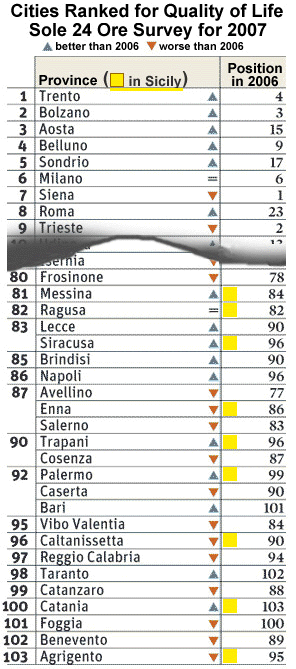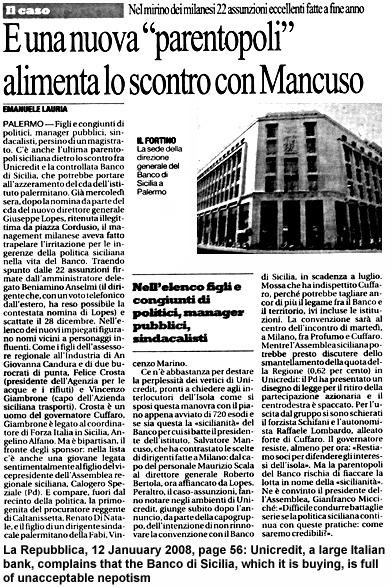...Best of Sicily presents... Best of Sicily Magazine. ... Dedicated to Sicilian art, culture, history, people, places and all things Sicilian. |
by Marco Tedesco (a pseudonym) | ||
Magazine Index Best of Sicily Arts & Culture Fashion Food & Wine History & Society About Us Travel Faqs Contact Map of Sicily |
Then I saw the police officers. Dozens of them. On foot, on parked motorcycles, in cars. The scene was nothing short of chaotic. Somebody had phoned in a bomb threat, menacing the law department right near the Quattro Canti. This explained the greater-than-normal confusion. Who, you might ask, would place a bomb in the law department of a mediocre
Italian university? Surely not terrorists seeking important cultural I'm writing this (under a pseudonym to avoid possible reprisals) to explain what it is like for a university student in Sicily. The day of the bogus bomb scare I was to meet with two professors to discuss my "thesis," my course work being complete. Not much writing is required in the typical Italian undergraduate programme, but to receive an undergraduate degree a so-called "thesis" is required --"so-called" because these glorified "term papers" are, in practice, little more than sanctioned plagiarism; there's rarely much original research involved. Everybody knows this but the charade continues, inherited from about a century ago, when most Italians were still functionally illiterate and anybody who managed to complete a four-year degree programme was acknowledged as a "dottore" (doctor). Indeed, once I receive my degree people will call me "dottore." The first professor I was to meet to discuss my thesis was unavailable despite his announced office hours. When I arrived about a dozen students were waiting outside his office. The professor didn't arrive while I was waiting. After an hour I left. In Italy a professorship is, in practice, a well-paid sinecure entailing relatively little work, but, like a thousand other political science students almost ready to graduate, I need the collaborative approval of two professors for the topic of my thesis before I can begin to write it. The professor's absence was not unusual. This was actually the third time I tried to meet with him. Like the others, he fails to respond to emails and is generally difficult to reach. It's difficult to imagine something like this happening at Sapienza (Rome) or Bocconi (Milan), both respectable universities. Next I went to the library. Palermo's university doesn't have a large central library (for use by all students) but each department has one. In the case of the political science department the "library" is about the size of a large conference room. Getting authorisation to use it is almost impossible, so most of us do what research we can at the large public library a few blocks away. It isn't possible (without much bureaucracy) to borrow books from it, but at least books can be consulted, even if the volumes are not numerous compared to the libraries of many cities of comparable population. Many of the world's universities measure their intellectual potency, in part, by the number of volumes in their libraries. By that standard, the University of Palermo might not even be considered a real institution of higher learning. In writing this, I promised Best of Sicily's editors not to dwell too much on general corruption, but it does have an influence on the students. Grading is often so subjective that after my first year I decided to forget about it and just take my courses and exams and get my degree as soon as I could, regardless of the grades; many students take seven or eight years to get their degrees. The academic staff is overwhelmingly over-fifty and male, and I'm also tired of --but accustomed to-- the idea of a cute girl showing up in a tiny miniskirt for an oral exam (in some subjects final examinations have both written and oral components) and getting a higher grade than me even though she responded with the same answers. A medical student I know says that he has had the same expereience, so it's not limited to one department. I've seen other bizarre incidents over the last three years. Once, during an oral exam in English at which around forty students were present, a girl about to be tested told the professor and his assistants (with some forty witnesses watching) that she hadn't studied and therefore couldn't possibly pass the exam, but that she should be awarded a passing grade anyway, without even having to answer a single exam question, because the professor and his assistants "had nothing to lose" by granting her this unusual request. "What difference does it make to you?" she asked defiantly. They didn't see it the same way, so she received a failing mark. On another occasion, this time during a written examination, the professor, in an effort to discourage rampant cheating, casually mentioned that there were three versions of the test being distributed. Upon hearing this, about half the students simply rose from their seats and "discreetly" left the exam room. No comment. Merit doesn't count for much here. At another university in southern Italy a bunch of professors and functionaries have the same surname (they're all closely related), a result of rampant nepotism in Italy's academic public sector and elsewhere --such as the infamous Banco di Sicilia (the largest bank in Sicily, described below), which is partly owned by Sicily's regional government and operates largely as if it were a public agency. That's one of the reasons you find so many Italian professors teaching abroad, fleeing the nepotism and cronyism endemic here in Italy. I attend this university for several basic reasons. It is near my home, it is inexpensive and affordable, it offers a degree programme that I like, it... I guess I've already listed the only reasons. Right now, I'm doing everything I can to live and work in the United States, where, thanks to the generosity of some American friends, I've spent most summers over the last eight years. That's because it's almost impossible for a young graduate to find a dignified, well-paying job in Sicily or anyplace in Italy, and I like the idea of living in a country where real possibilities for a good job and a good life still exist for somebody without special connections to obtain a public-sector job or a wealthy father ready to leave him a business empire, and I don't have either of those things. When you read that "Italians no longer emigrate" to America or elsewhere you are reading a simplistic analysis or, at the very least, a very gross exaggeration based on incompletely reported statistics. Sometimes it's complemented by interviews with a few wealthy but politically leftist (possibly anti-American) young Italians who stand to inherit successful family businesses, but who do not represent the vast majority of young Italians who must struggle to find a job. Others may have a "sour grapes" perspective because they know that with recent immigration restrictions it's more difficult than ever to go live in the United States. While I can only speak for myself, I'm not alone. Sicily itself suffers a serious "brain drain" of well-educated young people who leave to find work in northern Italy or around the European Union. Although today's exodus can hardly be compared to that of the 1920s, many young Italians do, in fact, go to live in countries outside Italy and outside the European Union. The United States, Australia and Canada have large numbers of recent Italian immigrants but they are sometimes "invisible" because (unlike times past) they don't form a cohesive "immigrant community" residing in a single place. The "official" statistics minimising this, especially as regards recent immigration into the United States, are nothing less than ridiculous. I personally know of five Italians in their twenties or early thirties who live in the United States --some illegally-- as immigrants who have resided there since 2000 or later. Italians are not unique; I've also met professionals (such as physicians) from England and Ireland who have immigrated to the United States in search of greater career opportunities than those offered back home. In 2007, Tony Blair (then the British prime minister) made the point that the United States, whatever its imperfections may be, is one of the few places in the world people want to go to but don't want to leave. With very few exceptions, the only American "immigrants" you meet in Sicily are those (usually women) married to Italians, or the American-born children of Sicilians. Beyond my immediate circle, if I were to calculate the number of Italians
born after 1970 who I know of (not personally but through It's easy to see why some young people want to leave Palermo, if not for another country then for another part of Italy. Palermo has an amazing history with much to see --especially the medieval and baroque churches, monasteries and palaces of what was once one of the wealthiest and most important cities of Europe and the Mediterranean; tourism is one of the few lucrative local industries. But the city's air is usually the most polluted among Italian cities, and a huge new refuse incinerator on a hill overlooking town will only make it worse, while Palermo is regularly distinguished by newspaper and statistical surveys for the "lowest quality of life in Italy." The poverty and unemployment that affect much of the city make for a depressing picture. Even so, there are always a few vocal Sicilians who choose to live elsewhere but carry a certain nostalgia for the place. My question to any Sicilian living outside Sicily who thinks that it is "Paradise" or who takes issue with any of my statements: If it was so fantastic, why did you leave Sicily? Shown here (below the Sole 24 Ore survey) is an article on nepotism in the Banco di Sicilia, where it's nearly impossible for an "unconnected" person to get a job. The article describes how management of Unicredit, a Milanese bank buying the Sicilian bank, will not accept this practice. This is interesting in that it shows how Sicilian corporate practices differ from those in the rest of Italy. It would be easy to brand me an isolated malcontent, but I'm not alone. In its annual ranking of Italian provinces for quality of life, the newspaper Sole 24 Ore (Italy's "Wall Street Journal") presently places all the Sicilian ones in the lowest 20%. Not a single Sicilian province rated better than 81st place. The chart shown here is based on the 2007 survey and analysis, which considered numerous factors, including employment, consumer prices, public services (health care, schools, water, etc.), cultural activities, crime rates and air pollution. A few years ago Palermo had the distinction of being in last place; now it's Agrigento. (Italians know this list is really a ranking of cities rather than provinces.) It's not just about Sicily. Italy is having problems generally. A recent article in The Economist ("Italy's Fiscal Policy: Tax Bonanza" Jan 5th-11th 2008, page 26) states, among other things, that in 2007 the Italians, "were overtaken by Spain in GDP per head." Not very good news for a young university graduate. Fortunately, the world is a big place. Sicily is beautiful and interesting, and well worth a visit (Concierge.Com named it one of its top ten travel destinations for 2008). It just isn't the easiest place to work or study. About the Author: Marco Tedesco (not his real name) is a student graduating from the University of Palermo who has travelled around Europe and the United States. | |
Top of Page |
 It seemed like the perfect Sicilian autumn day, made to order. A little
windy, sunny but not too hot. But as I made my way into
It seemed like the perfect Sicilian autumn day, made to order. A little
windy, sunny but not too hot. But as I made my way into  targets,
and wouldn't the local criminals (the Mafia) target a judge or prosecuting
attorney rather than a few professors and law students? In fact, the "bomber"
was none other than a law student who didn't feel like taking the exam scheduled
for that day. And for this nonsense an entire section of the city was virtually
closed down for six hours on a Tuesday. Welcome to Palermo.
targets,
and wouldn't the local criminals (the Mafia) target a judge or prosecuting
attorney rather than a few professors and law students? In fact, the "bomber"
was none other than a law student who didn't feel like taking the exam scheduled
for that day. And for this nonsense an entire section of the city was virtually
closed down for six hours on a Tuesday. Welcome to Palermo. friends and acquaintances)
who live in the United States the list would include almost twenty people.
As I'm just one person from western Sicily, the implication is that many
thousands of Italians end up immigrating into the United States every year,
whether their stays there are based on long-term visas for working (usually
in high tech industries) or for marrying American citizens, or based on
remaining there illegally. Each case is unique, but to say that only a few
hundred or a few thousand Italians go to live in the United States each
year is grossly inaccurate. I also know other people my age who would go
to live there if they could, to avoid silly career limitations, low salaries,
a high cost of living and incredibly high taxes. Despite what you may read
or hear, the "sogno americano" (American Dream) is still alive
and well here in Sicily.
friends and acquaintances)
who live in the United States the list would include almost twenty people.
As I'm just one person from western Sicily, the implication is that many
thousands of Italians end up immigrating into the United States every year,
whether their stays there are based on long-term visas for working (usually
in high tech industries) or for marrying American citizens, or based on
remaining there illegally. Each case is unique, but to say that only a few
hundred or a few thousand Italians go to live in the United States each
year is grossly inaccurate. I also know other people my age who would go
to live there if they could, to avoid silly career limitations, low salaries,
a high cost of living and incredibly high taxes. Despite what you may read
or hear, the "sogno americano" (American Dream) is still alive
and well here in Sicily.